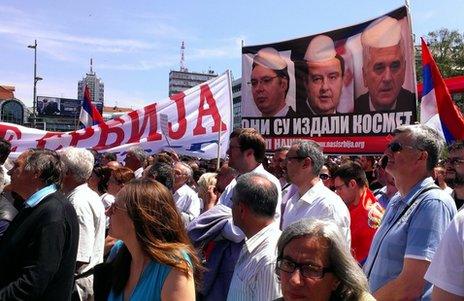Feeling betrayed in north Kosovo
- Published

"I'd kill him if I could," shouts the shopkeeper, cheerfully, in the main town of northern Kosovo.
He is watching police dogs snuffling about the drab municipal building on the Serbian, northern side of the divided town of Mitrovica, preparing for the visit of Aleksandar Vucic.
Serbia's first deputy prime minister is the most popular politician in his home country, with an approval rating that hovers above 70%, but among the Serbs of north Kosovo, his name is mud.
In April, Mr Vucic was one of the key figures behind an agreement to normalise relations that Serbia made with Kosovo. It covered a range of issues but the most controversial, and difficult to settle, was the future of north Kosovo's ethnic Serb population.
It has refused to recognise the authority of the majority-Albanian government in Pristina which unilaterally declared independence from Serbia in 2008. Instead, with financial support from Belgrade, Serbs have run their own "parallel institutions" in key areas like justice, education and healthcare.
Under last month's "Brussels agreement", these would go. Instead the Serbs would have a degree of autonomy within the main Republic of Kosovo system. For people who still consider themselves Serbian - with car number plates, identity cards and school certificates all issued by Serbia - this is an unacceptable situation.
Feeling betrayed
"Most of the people are afraid and feel betrayed by the Serbian government," says Aleksandar Arsic, a teacher at a vocational high school in Mitrovica.
"They said they would protect us - but this is not the way to do it."
Like many of the 20,000 Serbs who live in this city, he receives his salary from Belgrade. In total, around 60,000 ethnic Serbs live in the four municipalities of north Kosovo. A similar number live south of the River Ibar which divides Mitrovica, and come under the direct control of the Republic of Kosovo government in Pristina.
According to OSCE estimates, up to 200,000 Serbs who fled Kosovo after the 1999 war have never returned - but those who stayed, or the few who came back, now feel betrayed.
"Some kind of bureaucrats - from the EU, Serbian government, from the Kosovo government - decided okay, we'll put the people from one state into another state without asking them how they feel. It's a nightmare, it's a bad dream," Mr Arsic says.
Feelings are running high. The north Kosovo Serbs organised a rally in Belgrade just before Mr Vucic's visit, appealing to their fellow Serbs to put a stop to the deal.
As the crowd chanted "treason" and "Kosovo is Serbia", two heavily bearded Orthodox priests scuffled on the temporary stage in Republic Square - a difference of opinion, perhaps, over how the Church should tackle the issue.
Among the thousands at the gathering, some held a banner depicting Mr Vucic with an Albanian cap on his head, with President Nikolic and Prime Minister Dacic similarly Photoshopped.
So it was not surprising when Mr Vucic received a hot reception on his arrival in Mitrovica. A booing, whistling crowd outside was a foretaste for the barracking he received from local councillors in a meeting which went on for several hours.
Long struggle
But the first deputy prime minister was showing no signs of budging from his stance. Even the hoots of disapproving vuvuzelas in the nearby town of Leposavic failed to rattle him.
"It's an old Serbian instrument," he quipped, before going on to defend the agreement.
"I will not lie to my people and I will not promise my people more. For the first time you will have a Serbian community recognised by the entire world and a clear indicator that the Albanian boot will not step on north Kosovo."
But it will take more than words to persuade the Serbs here to accept the deal. Judging by the grim faces of the local mayors, some political arm-twisting may be applied. But the fact is that without the co-operation of the people in north Kosovo, the deal simply will not work.
"The level of unity of the locals in rejecting this deal is overwhelming and it's hard to see how a deal with no local buy-in or ownership can stick," says Srdjan Jeric, the Balkans Analyst for the International Crisis Group.
"The question is: how long can they remain united in rejecting the deal and what sort of sanctions might they face in continuing to do so?
"But if they continue to reject the deal, that raises questions about the process as a whole - because the whole point of the deal was to make life better for them. But they overwhelmingly rejected it."
It may be a long and painful struggle, pitting the most powerful and popular politician in Serbia against a resilient community which believes it has a righteous cause. One side is keen to get EU membership talks under way - the other is desperate not to be sacrificed so that can happen.
If anyone believed that compromising with Kosovo would be the hard part of the deal, they must now be thinking otherwise.
- Published13 May 2013
- Published22 April 2013
- Published8 April 2013
- Published17 February 2013